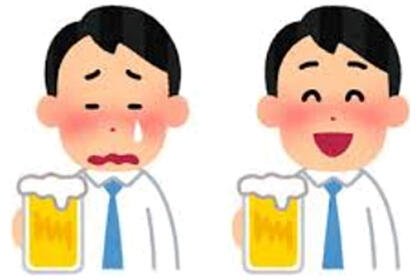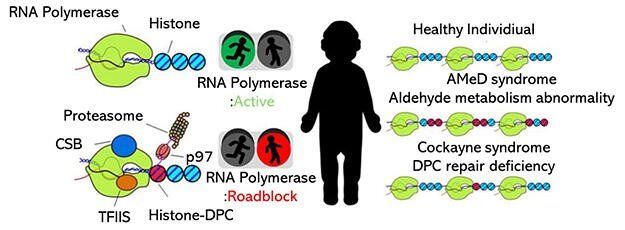A research group at Nagoya University reported that aldehydes produced in the body when drinking alcohol may damage genes and cause aging. Research to date has pointed to various causes of aging. This study determined the cause of the onset of "premature aging syndrome," a rapid aging process, and revealed a new "bad" effect of alcohol.

Aging is inevitable, but its speed varies from person to person. Although there are many unknowns, the mystery of aging is gradually becoming clearer as research results indicating specific causative agents are being published.
The research group includes Lecturers Yasuyoshi Oka and Yuka Nakazawa, Research Technician Mayuko Shimada, and Professor Tomoo Ogi at the Department of Genetics of the Research Institute of Environmental Medicine (RIeM) at Nagoya University.
The causes of aging include "oxidation" and "glycation" of cells and proteins that build the body. Therefore, active oxygen and other substances that cause oxidation have been attracting attention. However, according to the research group, experimental results never indicated that aldehyde-derived substances formed during the metabolism of alcohol cause aging.
The aldehyde-degrading enzyme "ALDH2" is crucial in detoxifying toxic aldehydes. According to the group, about 40% of Japanese people have a genetic trait called a "single nucleotide polymorphism" that reduces ALDH2 activity.
The research group focused on people who feel sick after drinking a small amount of alcohol, have a genetically weak ALDH2 activity, and are unable to break down aldehydes. In 2020, the researchers revealed that if a similar enzyme called "ADH5" failed to work simultaneously with ALDH2, it could cause a genetic disease called "AMeD syndrome," a premature aging disorder where aging begins in childhood. The researchers believed that gene damage caused by aldehydes is also related to aging; therefore, they continued experiments on mice using next-generation sequencing analysis technology.
As a result, in the mouse model of AMeD syndrome, DNA damage (DNA-protein crosslink (DPC)) in the gene caused by "formaldehyde," a typical aldehyde that remains unbroken in the body, accumulated. The function of repairing the DPC was in a state of "overload." In addition to AMeD syndrome, Cockayne syndrome also falls into the category of premature aging syndrome. In Cockayne syndrome, DPC repair was in the "deficient" state and was not normal.
The research group believes that these defects in DPC repair prevent rapid damage repair and cause premature aging.

Provided by Nagoya University

Provided by Nagoya University
Oka et al. believed that finding compounds capable of eliminating aldehydes will lead to the discovery of drugs for the treatment of premature aging and the proposal of aldehydes as a new causative agent of aging. It is believed that many Asians, including Japanese, have weak ALDH2 functions. The research group found that about 40% of Japanese with weak ALDH2 function are susceptible to genetic damage caused by aldehydes produced by alcohol consumption. As a result, alcohol consumption may hasten the aging process.
According to the Ministry of Health, Labour and Welfare's data, there are two types of aging: normal aging, which is not defined by external factors, and pathological aging, which is accelerated by disease or environmental factors. Regarding the cause of normal aging, the Ministry states, "There are various hypotheses, but the free-radical theory is currently the most promising." Free radicals are unstable molecules that take electrons from other molecules, and the molecules deprived of electrons are oxidized. Reactive oxygen species such as superoxide are classified as free radicals.
A series of Nagoya University studies did not investigate the relationship between the degree of drinking, or alcohol intake, and accelerated aging. Some studies suggest that in moderation, drinking has social benefits, such as promoting human relationships and physical benefits, such as improving blood circulation and reducing stress.
The results of this research were published in the international academic journal Nature Cell Biology on April 10.
Original article was provided by the Science Portal and has been translated by Science Japan.




